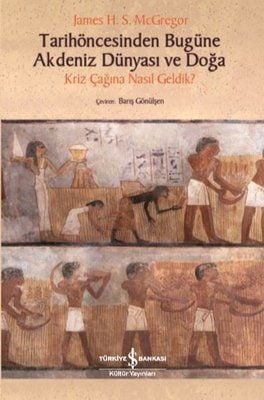
Tarihöncesinden Bugüne Akdeniz Dünyası ve Doğa - Kriz Çağına Nasıl Geldik?
(0) Kommentar - 0 Partitur
Category
Author
Stock
99 Piece
Stock code
PX0000016140
Lagerbestand
Auf Lager
Yayınevi
Price
21,50 USD + VAT
*starting from 3,22 USD!
%20 Rabatt
21,50 USD
17,20 USD
Mediterrane Welt und Natur von der Urgeschichte bis zur Gegenwart – Wie sind wir in das Zeitalter der Krise gekommen? Buchbeschreibung Land war die kulturelle Grundlage der frühen Mittelmeervölker; Sie akzeptierten, dass sie mit dem Land verbunden und ihm nahe waren, und erfassten die Natur durch die ländliche Welt, die auf verschiedene Weise dargestellt wurde. Dieses Bild der Natur hatte sie in allen Lebensbereichen durchdrungen, vom Handel bis zum gesellschaftlichen Leben, von religiösen Ritualen bis hin zu landwirtschaftlichen Aktivitäten. Jahrtausende lang gab es keinen klaren Unterschied zwischen der Menschheit und dem Land, in dem sie lebte. Es herrschte weitgehend Einigkeit darüber, dass ein weitgehend harmonisches Verhältnis zur Natur bestehe. Die traditionelle Landwirtschaft im antiken Mittelmeerraum widersprach nicht den Grundzügen natürlicher Ökosysteme. Sie war reich, komplex, selbstorganisierend und flexibel. Diese Beziehung endete im späten 18. Jahrhundert, als die Natur begann, als wilde Landschaft wahrgenommen zu werden, an der der Mensch nicht beteiligt war. Um die Jahrhundertwende waren die menschliche Welt, der landwirtschaftliche Bereich und die Wildnis ein zusammenhängendes Feld ohne innere Grenzen. Aber am Ende des Jahrhunderts hatten wichtige Schriftsteller dieser Zeit eine scharfe Trennung innerhalb dieser Kontinuität geschaffen und die Welt der Landwirtschaft von der Welt der Natur getrennt. Dieser plötzliche und dramatische Sensibilitätswandel stellte das ökologische Verständnis auf den Kopf und führte zu sehr wichtigen Konsequenzen, mit denen wir immer noch zu kämpfen haben. James HS McGregor argumentiert, dass die Wurzel der Umweltkrise, mit der die Welt heute konfrontiert ist, das Prinzip der westlichen Gesellschaft „Erste Natur“ ist ", die harmonische Beziehung zwischen menschlichen Gesellschaften und der natürlichen Welt. Er behauptet, dass seine Aufgabe hinter ihm liegt. Diese grundlegende Arbeit bietet uns nicht nur einen neuen Ansatz zur Umweltverantwortung, sondern zeigt uns auch, dass wir das alte Verständnis unseres Platzes in der Natur wiedererlangen müssen. Wir müssen unsere Position als Gegner und Widersacher der Natur aufgeben und zur Identität der Kultivierung mit den bewährten Techniken der Vergangenheit in der biologischen Welt, zu der wir von Geburt an gehören, zurückkehren. Vieles ist verloren gegangen, Land und Umwelt haben großen Schaden erlitten und traditionelles Wissen ist mitsamt seinen Trägern ausgestorben. Aber es gibt noch viel, was gerettet, bearbeitet und neu gedacht werden kann. (Aus dem Werbebulletin)
| Yayınevi | : | İş Bankası Kültür Yayınları |
| Sayfa Sayısı | : | 412 |
| Basım Yılı | : | 2021 |
| ISBN | : | 9786254052330 |
| Dil | : | Türkçe |
Be the first to review this product!
Güzel
B... G... | 18/10/2025
Gayet güzel sorunsuz işkeyen bir sistem
Zübeyir Kaya | 17/10/2025
Her zaman güvenerek alışveriş yaptığım bir site.
D... E... | 03/10/2025
Her zaman güvenerek alışveriş yaptığım bir site.
D... E... | 03/10/2025
İyi beğendim
pratik cocuk etkinlikleri | 18/09/2025
İyi güzel
pratik cocuk etkinlikleri | 18/09/2025
Sitenizi çok beğeniyorum. Başarılar
S... A... | 29/07/2025
Ömer Aksoy | 25/07/2025
Kovareke giranbiha
O... K... | 30/05/2025
Kürtler için yapılmış güzel şeylerden bir tanesi
M... A... | 16/04/2025


